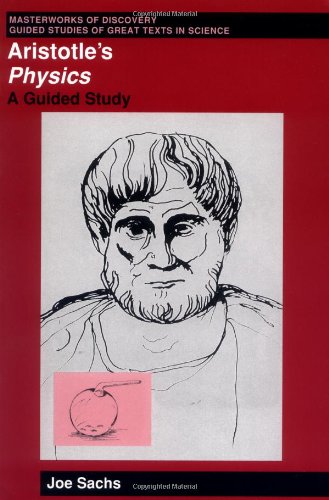Aristotle's Attempt to Categorize Motion
11 Now everything that changes place is moved either by itself or by something else. In as many of these as are moved by themselves, it is obvious that the moved and mover are together, since the first mover is present in them, so that nothing is in-between. But as many as are moved by other things must come about in four ways, for there are four kinds of change of place by means of something else: pulling, pushing, carrying, and whirling. For all motions with respect to place lead back to these; for pushing on is a kind of pushing, in 20 which that which moves something away from itself pushes while following along, whereas pushing off is one in which it does not follow along when it has moved something, and 243b throwing is one in which it makes the motion away from itself more violent than the change of place the thing has by nature, and the thing is carried along for just so long as this motion prevails. Again, tearing apart and pressing together pare pushing off and pulling: tearing apart is pushing off (since it is a pushing off either away from the mover itself or away from something else), and pressing together is pulling (since it is a pulling either toward the mover itself or toward something else). And it is the same as well with as many kinds as there are of these, such as smoothing down and combing, for the former is a pressing together and the latter a tearing apart. And it is similar with the other combinings and separatings—for they 10 will all be tearings apart and pressings together—except for those in a coming into being or a destruction. At the same time, it is clear that combining and separating are not a distinct class of motion, since all of them are divided up into some of those mentioned. Further, inhaling is pulling and exhaling pushing. And it is similar with spitting and as many other motions as there are throughout the body of secretion or absorption, for some are pulling and others pushing away. And it is necessary that the other changes of place also be led back, since they all fall into these four kinds.
Notes:
His efforts to build a taxonomy of motion demonstrates the difficulty of properly classifying things as a foundation to building hypotheses.
Folksonomies: categorization hypotheses classical thinking inductive logic
Taxonomies:
/automotive and vehicles/vehicle rental (0.659220)
/law, govt and politics/legal issues/legislation/tax laws (0.497098)
/business and industrial/advertising and marketing/marketing (0.496886)
Keywords:
properly classifying things (0.915253 (neutral:0.000000)), motion (0.803279 (negative:-0.451581)), mover (0.774648 (negative:-0.381279)), distinct class (0.643873 (neutral:0.000000)), kinds (0.630446 (positive:0.004931)), place (0.518960 (negative:-0.376312)), motions (0.513864 (positive:0.048223)), changes (0.502535 (neutral:0.000000)), change (0.489669 (negative:-0.376312)), tearing (0.412910 (negative:-0.520625)), hypotheses (0.409743 (neutral:0.000000)), Aristotle (0.404047 (neutral:0.000000)), difficulty (0.401693 (neutral:0.000000)), foundation (0.398283 (neutral:0.000000)), taxonomy (0.397147 (neutral:0.000000)), secretion (0.396571 (negative:-0.255630)), efforts (0.396291 (neutral:0.000000)), spitting (0.396039 (negative:-0.255630)), pressings (0.394045 (negative:-0.289403)), throwing (0.392797 (negative:-0.376312)), respect (0.390780 (positive:0.303853)), ways (0.389450 (negative:-0.292681)), means (0.388040 (neutral:0.000000)), absorption (0.387753 (negative:-0.255630)), kind (0.387745 (positive:0.343227)), nature (0.386395 (negative:-0.376312)), destruction (0.384240 (negative:-0.289403)), combinings (0.382445 (negative:-0.289403))
Entities:
Aristotle:Person (0.824171 (neutral:0.000000))
Concepts:
Thing (0.919071): dbpedia
Kind (0.611884): dbpedia
Motion (0.597540): dbpedia
Change (0.595237): dbpedia
Smoothing (0.594709): dbpedia | freebase
Taxonomy (0.582773): dbpedia | freebase | opencyc
Press (0.579591): dbpedia
MOVE (0.577543): website | dbpedia | freebase





